- Home
- Iain Pears
Giotto's hand Page 2
Giotto's hand Read online
Page 2
Bottando, for once, had been rather slow off the mark in meeting the threat, and was now paying the price. Because Argan was so ludicrous, he had not taken the man seriously. Only when his secretary had undertaken a do-it-yourself espionage operation late one evening, and handed over photocopies of the innumerable reports and memoranda the man had been sending off to those in high places, did the magnitude of the problem become clear.
In brief, Argan wanted Bottando’s job, and was trying very hard to get it. His line was that, in these days of international crime, old-fashioned policing (for which read old-fashioned policemen, as personified by General Taddeo Bottando) was no longer sufficient. What was needed was an efficient organization (i.e. a cheaper one) headed up by an executive skilled in man-management and resource allocation (i.e. himself). No mention in any of this of catching criminals or recovering lost works of art.
War had broken out, in a quiet and civilized fashion. Bottando found that his tardiness had blocked off the obvious response: it was too late now to chuck the man out for fear of being accused of wanting to hide something. As much as possible, he fed him false information, so that he could be made to look a fool. Unfortunately, Argan, as an art historian, didn’t think facts were so important anyway and carried on regardless.
On his side, Bottando had the policing establishment, who quite rightly saw enthusiastic amateurs as a threat to them all. On the other. Argan had the bureaucracy, which believed firmly that the quality of an organization depended solely on how many jobs it provided for administrators. And they, as Bottando was aware, were the ones with the check books.
For the past month. Bottando’s counter-offensive had run into the sand. Argan had taken full possession of all the right words, like efficiency and results and cost-effectiveness, and Bottando had not worked out a way of opposing the man without seeming old. fusty and hidebound. He was reduced, therefore, to grumbling ferociously and hoping Argan would make a mistake. So far, patience had not been rewarded, mainly because Argan didn’t actually do anything except watch other people and say, with the benefit of hindsight, how it should have been done better.
“And how are we this morning?” said this walking insult to all the traditions of good policing. “Still solving those crimes, I hear. I couldn’t help overhearing your fascinating discourse on criminal detection.”
Bottando scowled at him. “I hope you found it instructive.”
“Very helpful, yes. An important Etruscan site robbed overnight, I see?”
That was the other trouble with him. He always had a quick look through the overnight reports so that he had this vague patina of being on top of things. Bottando had been diverted by Giotto and hadn’t got around to it yet.
“I know,” he replied steadily nonetheless. “But there’s not much we can do until we have a full report on what was stolen.” Always a safe remark, that.
“Oh, I think we should get involved a bit earlier than that. Nice case like this, looks very good. We have to keep up the department profile, after all. And the destruction of our heritage through the spoliation of sites of immense historical significance…”
And off he went, talking away as though he were instructing a class of five-year-olds. That was another problem with him, Bottando had once explained gloomily to a sympathetic colleague in Corruption one evening. Quite apart from the fact that he could never resist an opportunity to be didactic, Argan was more of a marketing executive than a policeman. He didn’t care how effective the department was as long as it looked good.
“Not our case yet,” Bottando repeated firmly as Argan was getting into his stride. “Unless you want to get a reputation for poaching. If you like I could telephone the Carabinieri and say you personally want to take over…”
“Oh, no. Of course, I bow to your experience in these matters,” Argan said. Much too smart to be caught out by an obvious ploy like that.
“So,” he went on, “what’s this conference with the lovely signorina about, then?”
The lovely signorina ground her teeth, and Bottando smiled. Argan was trying to charm his staff over on to his side. He was not really adopting the right approach with Flavia. Some of the others, however…
“The lovely signorina and I were planning our day,” said Bottando.
“This?” Argan said, picking up the letter disdainfully.
“I really must ask you not to read my mail without my permission.”
“Sorry,” Argan said, putting it down with an unapologetic smile and sitting beside Flavia on the sofa. She got up. “I imagine you won’t be doing anything with it. A thirty-year-old crime is hardly a high priority.”
“All crimes are a high priority,” Bottando said pompously.
“But some are more so than others, surely? And to concern yourself with an ancient affair and turn a blind eye to a robbery only last night…”
It was like talking to a brick wall, Bottando thought.
“How often do I have to explain that our main brief is to recover works of art?” he said testily. “Criminals are secondary. If a painting can be recovered, it doesn’t matter whether it vanished last night or thirty years or a century ago. And to miss an opportunity because we don’t make elementary checks would be a gross dereliction of our duty.”
“Of course,” Argan purred, giving way with suspicious grace. “You’re in charge. General. You’re in charge.”
And on that ambiguous note he left. Only afterwards did Bottando calm down enough to realize that much of the Giotto file had vanished with him.
“No,” said Jonathan Argyll with suitable concern that evening, as they sat companionably on the balcony of their apartment and felt the sun go down at long last. “It doesn’t sound good. You’ll have to nobble him.”
Flavia had spent much of their meal talking about the iniquities of Corrado Argan. It’s difficult to avoid a degree of obsession if you’ve spent the better part of the morning calming your boss down and persuading him that sober reason would be a better response than foot-stamping fury.
“What was this picture, anyway?” Argyll asked, considering then postponing a decision about doing the washing up. “Is it really worth going to investigate?”
She shook her head. “Not a clue. It’s meant to be by Uccello, a Madonna and child. Whether it is or not I couldn’t tell you. There’s no photograph of it and the descriptions aren’t very good.”
“It’s very diligent of you to take all this trouble.”
“No, it’s not. It’s politics. Argan doesn’t want Bottando to look into this, and so Bottando, to show he’s in charge, will have to do just that. Having gone on about leaving no stone unturned to recover paintings, he has to go and peek under some pebbles. Otherwise he seems slack even by his own standards.”
Argyll nodded, then stood up and gathered the dirty plates. Too many flies around this evening. “It’ll land him in trouble one day, you know,” he said sagely. “Does he have to be so pugnacious?”
Flavia smiled knowingly. “It’s easy to tell you’ve never worked in a large organization. Argan’s a fool, but he has such boundless self-confidence that he convinces people who don’t know any better. Which means that he is constantly being put in positions of authority. So everybody else has to spend a great deal of time tripping him up. It’s all part of the job.”
“I’m glad I’m self-employed, then.”
“But unlike you, we get our salaries even if we don’t do anything. In fact, in Argan’s case, the less he does, the more he gets.”
A sore point. Argyll remained convinced that, somewhere out there, an individual existed who desperately wanted to buy at least one of his pictures. Finding this person was proving massively difficult at the moment. So much so that he was seriously having to consider what he gloomily called alternatives. A full-blown crisis had been precipitated by the arrival of a letter from an international university in Rome which processed eager young things anxious to learn about art and culture. One of its art historians had
absconded to a better job at the last moment, and they had in desperation written to Argyll. Did he want a job for a couple of years teaching from the Caracci to Canova?
Flavia had seen this as a solution to all his problems, but Argyll wasn’t so sure. He’d worked hard to set up as a dealer; giving up now would seem very much like failure. And he hated the thought of being forced to give up. Besides which, teaching looked like hard work to him.
Deeply depressing. He had enough money to trickle along, but so far had failed to make a breakthrough into the next division up. He needed to buy better pictures. But to do that, he needed some capital to buy the better pictures to start off with, and he simply didn’t have it. He’d grumbled away for weeks and months, and now he’d decided to go off to England to consult his old mentor and employer to see if he had any ideas.
He’d not been very good company recently. But then, nor had Flavia. She didn’t mind Argyll not making much money; she did mind him not being able to make up his mind about what to do. The job offer had been lying around for nearly two weeks now, he still hadn’t responded, and his constant fretting was, in her view, becoming tiresome. She was very tolerant, normally. But as he did have to make up his mind sooner or later, she didn’t see why he couldn’t get it over with.
“What’s this Giotto idea, then?” he said as a diversionary tactic to make the conversation less depressing.
“Pouf! Nothing really. Just a fancy of the General’s when he got snookered by a stolen Vélasquez.”
“This the one he had pinned up in his office a couple of summers back? The one that got him into trouble with the ministry?”
“That’s right. A well-connected owner. It was worth looking at, but he was right to junk the whole idea. He spotted a couple of dozen thefts which all seemed to be by the same hand. Houses with old collections and pictures that hadn’t been on the market for decades, if not centuries. Badly catalogued and often unphotographed. Small pictures of high value, generally High Renaissance. All chosen with an expert eye, and all stolen very deftly: no violence, no sign of break-ins, no damage to anything. Whoever did them all went in and out within minutes, knew exactly what they were after and were never distracted. Only one picture taken on any one occasion. All indicating, so he thought, a suspiciously similar degree of patience and dexterity.”
“Sounds good to me. What’s wrong with the idea?”
“Because it goes against common sense and his fundamental law of art theft, which is that thieves aren’t that good. Which is perfectly true. They’re greedy, impatient, clumsy and generally not very bright. They make mistakes. They talk too much. They get shopped by accomplices. They don’t methodically pursue their careers for thirty years, never overreaching themselves, never making a mistake, never trusting the wrong person, always resisting the temptation to tell the world how clever they are. And most of them now work for organized crime: lone thieves are virtually extinct.
“Giotto was a figment of the imagination, and Bottando is much too sensible to be led astray by such nonsense. You know him. Your turn to make the coffee, I think.”
2
The address in the Parioli section of Rome from whence the troublesome letter had begun its voyage to Bottando’s desk turned out to be that of a secluded, luxurious and probably fairly expensive nursing home for the well-heeled old and sick of the capital. It was one of a growing number of such establishments thrown up as pressure of work, space and modernity squeezed out grandparents from the homes of their children and sounded the death knell of the Italian mama.
Flavia arrived fairly early, in the hope of getting through and back to the office before the heat became too insufferable, and glanced around at the building carefully before making her way inside. The highly-polished doors, the marble flooring and the air of efficient, kindly and expensive care were, somehow, not quite what she’d expected from the spidery, ill-educated handwriting of the letter.
The first hitch came at the desk, where a bright and competent-looking receptionist said that it was not yet visiting time. Flavia produced her badge to show she was in the police and it still wasn’t visiting time. Flavia was explaining that, rules or not, it was important that she see Signora Fancelli, when her words were overheard by a priest who was passing by, who stopped and intervened.
“You are the person she wrote to?” he said, after introducing himself as Father Michele and assuring the receptionist that he would look after the visitor.
“She wrote to my boss,” Flavia replied. “I was sent along to talk to her.”
“I’m so glad. So glad. She was very much in a state of anguish about what she should do. If you wish, I will show you where she is.”
Flavia nodded, and Father Michele led the way out of the door, explaining that at this time of the year most of the inmates—guests, as he called them—were wheeled out into the garden for a little sun.
“It’s extraordinary how much they can take,” he said as they crossed the path and headed towards a small clump of trees. “In temperatures that make most people faint, they’re constantly calling for extra sweaters.”
“Is she well off?” Flavia asked, thinking about the proceeds of crime. “It must cost a bomb to stay here.”
“Dear me, no. As poor as possible. Quite wretchedly so, in fact.”
“But now…”
“A son in America, I understand. She came here several months ago, when she began to fail, and he pays the bills. And, I must tell you, she will die here as well. She is preparing herself.”
He pointed out a frail figure in a wheelchair, staring blankly into nothingness.
“That’s her there. Now, I’ll leave you. Please don’t think that the signora has lost control of her mind as well as of her body. She’s very sick, and her attention wanders, but there’s nothing wrong with her intelligence at all, although the painkillers make her drowsy. But please do not excite her too much.”
There was absolutely no doubt that the priest was speaking the truth there, Flavia thought as she approached the wheelchair, hoping the woman wasn’t asleep. The grey skin, sickly pallor, matchstick-thin arms and thin, wispy hair all indicated someone with very little time left. Nor was she quite as alert as Flavia had hoped, although, when she announced herself, she could see the woman making a distinct and costly effort to concentrate.
“Signora Fancelli?” Flavia began. “I’ve come about a letter you wrote. About a painting. I’d like to ask you about it.”
“Ah, yes,” she said, looking up and trying to focus on Flavia. “I wrote to you, did I? That was a long time ago, wasn’t it?”
“You appeared to be confessing to a theft. I must say that I don’t find that at all likely.”
“It has been a heavy burden for me, knowing what I did,” she said. “All these years. I’m glad to have an opportunity to talk to you. Whatever the price.”
Considering her health, and the habitual speed of the Italian judiciary, there didn’t seem much chance of the price being high; not in this world, anyway. She was not that old: early sixties, maybe. But she was manifestly running out of time.
“Would you like to tell me about it?”
A long silence, before her mind focused once more on the problem. “I didn’t know what I was doing, you see. Had I known, I would never have done anything. I was poor, that was certainly true; but I was never, ever dishonest. I hope you will believe that.”
Flavia nodded patiently; until she actually said something, there wasn’t much point in doing anything else.
“My parents were poor, and I was unmarried and had no one to look after me. I had to leave school and began working as a maid—a cleaner, really. Partly for a school for foreigners run by a woman called della Quercia, and partly for the Straga family. This was in Florence. Did I say that already?”
Even though it was not yet eleven o’clock, and they were in the shade of the trees it was already getting hot, and the time of year when the warmth is invigorating had long since passed. It was
a blisteringly hot summer, and the worst was yet to come. Flavia reacted to the warmth quickly; and bit by bit, her chin was sinking lower, and her attention was wandering. She was beginning to sweat in the heat, and this vague discomfort was about the only thing stopping her from falling asleep entirely.
“I admit, I was looking for someone to marry,” the woman was saying, somewhere to the far left of Flavia’s diminishing consciousness. “People do not worry about that any more, but then, if you weren’t married by the time you were eighteen, it was assumed there was something wrong with you. People laughed at me all the time. The old maid. But I was romantic. I didn’t just want a husband; I wanted to be swept off my feet by someone exciting, and dashing.
“There was one man who used to hang around with the girls. Geoffrey, his name was. Geoffrey Forster. An Englishman. Very good-looking, very charming. Rich, or so he said. Constantly referring to famous people as though he was their best friend, spending money, driving fast cars.
“Naturally, when he turned his attention to me I was flattered, and got delusions. I thought he was in love with me; no one had ever treated me like that before. It was only a dream, of course; I soon found out the truth. But, before I did, he took me on holiday.”
Out of sheer politeness—the story was evidently costing the old lady a great deal to tell—Flavia nodded sagely, and told her to continue.
“He asked me one day if I wanted to go to Switzerland with him, for a romantic weekend. Naturally, I agreed, and it never crossed my mind that there might be anything wrong. I’d never even been out of Tuscany before; the prospect of going to Switzerland, staying in fancy hotels, was a dream beyond anything I had ever imagined. I assumed it was merely a preliminary, and then soon we’d be making those trips together. I already thought that I might be pregnant, you see.”
Flavia was more interested now, and jerked awake by the harshness and bitterness in the woman’s voice. With renewed attention, she watched Signora Fancelli carefully, still not saying a word to interrupt her narrative.

 The Dream of Scipio
The Dream of Scipio Stone's Fall
Stone's Fall The Last Judgement
The Last Judgement An Instance of the Fingerpost
An Instance of the Fingerpost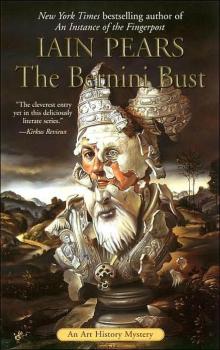 The Bernini Bust
The Bernini Bust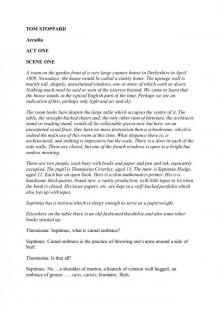 Arcadia
Arcadia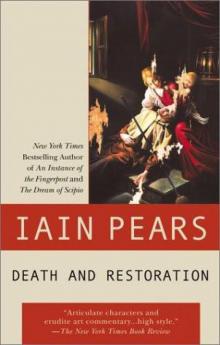 Death and Restoration
Death and Restoration The Raphael Affair
The Raphael Affair The Titian Committee
The Titian Committee The Immaculate Deception
The Immaculate Deception Giotto's hand
Giotto's hand The Portrait
The Portrait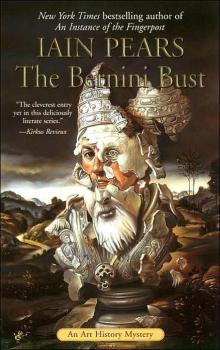 The Bernini Bust ja-3
The Bernini Bust ja-3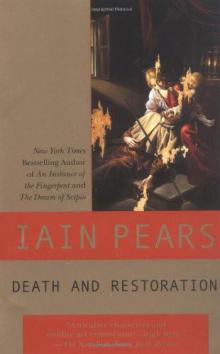 Death & Restoration ja-6
Death & Restoration ja-6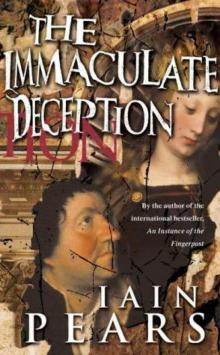 The Immaculate Deception ja-7
The Immaculate Deception ja-7